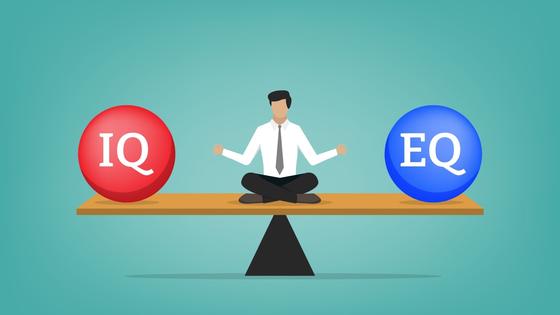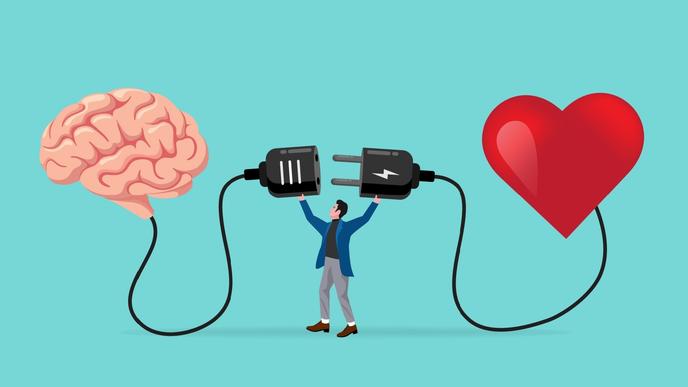Emotional Intelligence in Business and Management: What Matters More — IQ or EQ?
Today, emotional intelligence is gaining increasing importance in the business world — not just professional knowledge and competencies.

The ability to understand the nature of one's own emotions, control them, and recognize the feelings of others enables one to make sound decisions, build rapport with people, climb the career ladder, and bring the boldest dreams to life. But what other advantages does developed emotional intelligence offer to entrepreneurs and professionals across various fields?
What Is Emotional Intelligence: What EQ Is Made Of

Emotional intelligence falls under the category of soft skills. These are flexible competencies related primarily to an individual's personal qualities and are essential across all professions. Soft skills, and emotional intelligence in particular, are necessary for effective interaction with others and, ultimately, for achieving one's goals.
If intellectual intelligence, or IQ, involves perceiving information through analysis and rationalization, emotional intelligence, or EQ, is responsible for one's ability to recognize, properly interpret, and ethically express their own emotions, as well as those of others. It also includes understanding others' intentions, motivations, and desires. Equally important is the ability to apply knowledge and skills to solve practical problems, such as persuading a conversation partner, resolving conflict, finding compromise, and more.
The term entered psychologists' lexicon as far back as the mid-20th century, but it only gained widespread attention in the 1990s after the publication of the book Emotional Intelligence by American researcher and science journalist Daniel Goleman. In his work, Goleman argued that a high IQ alone is not sufficient to achieve success in either personal or professional life. EQ is just as crucial for living in harmony with oneself and others.
Emotional intelligence consists of several key components:
-
Self-awareness: understanding your own emotions and how they manifest, the reasons behind certain feelings, and how these impact your behavior, thinking, and habits.
-
Self-regulation: the ability to control impulsive reactions and manage your thoughts and actions in stressful or unexpected situations.
-
Empathy: the skill of recognizing other people's emotions, moods, and the motives behind their actions, and using empathy effectively in communication.
-
Motivation: the internal drive that helps people overcome both external and internal barriers, stay focused on task completion, move steadily toward goals, and continuously raise their ambitions.
-
Social skills: include conflict management, building and maintaining long-term trust-based relationships, active listening, and clearly and effectively expressing one's own thoughts.
That's why the ability to identify and manage emotions is one of the most essential skills for leaders. Specialists with a well-developed EQ, regardless of whether their job involves direct client interaction, provide companies with a significant competitive edge.
How Strong Emotional Intelligence Can Help You Succeed

In careers and business, developing EQ is important for:
-
Making well-informed and forward-looking decisions that take current circumstances and context into account.
-
Effective communication, quickly resolving conflicts, and maintaining a healthy psychological climate within the team.
-
Motivating employees and creating a comfortable work environment for them.
-
Managing stress, as a leader with high EQ can control their reactions, stay calm and rational even in critical moments.
-
Working with clients and boosting sales, since EQ helps identify customer needs and pain points, recognize one's own strengths and weaknesses, and define competitive advantages.
-
Maintaining relationships with partners and investors, thereby contributing to the overall prosperity of the business.
A leader with strong emotional intelligence ensures high employee productivity, team cohesion, and a sense of job satisfaction. According to branding agency Soocial, having a high EQ is valued several times more than IQ in the business environment. For instance, at Google, it has been noted that the most productive and highest-paid specialists aren't always the ones with the deepest technical knowledge. Rather, they are the ones who can work effectively in teams and demonstrate strong leadership.
EQ is also a major focus at Marriott International, a global hotel management company. Its CEO and President believe that employees with high EQ are better at understanding both the needs and hidden desires of clients. As a result, they interact with customers more successfully, manage conflicts more effectively, and build long-term relationships.
Test Your Emotional Intelligence: A Checklist from Lectera

Tick the statements you agree with:
-
I know which work situations (e.g., negotiations, project pitches, meetings) make me feel anxious or worried;
-
As a rule, I manage to stay calm and think clearly even under pressure (deadlines, conflicts);
-
I don't avoid disputes with colleagues or subordinates on work-related matters and know how to resolve conflicts;
-
I never ignore colleagues or subordinates, even if they disagree with my opinion;
-
I always notice changes in the mood or behavior of colleagues/subordinates;
-
I also monitor my own emotions throughout the day;
-
I believe that emotions and feelings are just as valuable a source of information as research data and statistics;
-
My priority is a psychologically healthy work environment, not just overachieving KPIs;
-
I always welcome constructive criticism from subordinates and strive to improve the work environment;
-
I believe that emotional incentives (recognition, support) are just as important for employees as material rewards;
-
I often change my communication style depending on who I'm talking to (subordinate, client, partner);
-
Even when something gets out of control, I quickly switch to plan B and adapt to new circumstances.
The more boxes you ticked, the higher your level of emotional intelligence. However, even if you're confident that your EQ is already strong, it still needs to be continuously developed and maintained at a high level.
How to Develop Emotional Intelligence in a Business Environment

In reality, there are many ways to develop emotional intelligence. These techniques can be practiced independently-what matters most is your willingness and, even more so, your patience.
Pay Attention to Your Emotions and Their Physical Manifestations
When developing emotional intelligence, constant attentiveness is essential. Observe what you say and how you move. The ability to self-observe is the foundation for understanding yourself and the reasons behind your actions. Pay attention to how you interact with colleagues, subordinates, and supervisors; how you behave in different social settings; why you make certain decisions; and which gestures, intonations, and facial expressions you use. Don't ignore your own emotional background-track which events evoke particular feelings in you, both positive and those commonly viewed as negative. This will help you rediscover yourself, better understand your inner world, and clarify what matters most to you and what can take a backseat.
Expand Your Emotional Vocabulary
The more words you have to describe your feelings, the better you'll understand and express them. Try to find more specific and accurate terms for each emotion. If you feel like calling an emotion "joy," try finding a synonym that better captures its nuance-perhaps you feel "playful" or "radiant" rather than just "happy"; "uneasy" or "restless" instead of merely "anxious."
Reflect
This is the next step once you've formed the habit of paying closer attention to your feelings and describing them more thoroughly. Reflection-or self-awareness-is the ability to analyze and evaluate your behavior, thoughts, and actions. It helps you move beyond stereotypes, impulsive reactions, and intrusive thoughts, allowing you to make thoughtful decisions and process past experiences properly. Self-analysis helps you understand how your emotions influence your behavior and relationships, to view yourself objectively, and to think critically. So, whenever something happens in your life-or when you're feeling nostalgic or thinking about the future-ask yourself as many questions as possible and try to answer them honestly and fully. For example:
-
"How do I feel about what happened?"
-
"What exactly went wrong?"
-
"What positive outcomes can I take away from this?"
-
"Why does this upset me so much?"
-
"What other emotions am I experiencing?"
-
"How do I feel physically?"
-
"Why did I act the way I did?"
-
"Could I have acted differently, and what would have changed?"
-
"What can I do to ensure this doesn't happen again?"
And don't forget to reflect after positive events as well. Analyze why a particular project succeeded, which personal qualities or professional skills helped you, and what new experiences you gained.
Keep an Emotion Journal
Recording your emotional experiences helps you conduct a deeper and more comprehensive self-analysis. It's best to keep a handwritten journal and record your strongest emotions at the end of each day (or even more frequently). Describe not only how you felt, but what triggered those feelings, how they manifested, and their physical signs. If you learn to recognize your emotions in time, you'll be able to manage any emotional state and resist external provocations.
Lectera’s Online Courses by topic
Meditate
Meditation promotes inner balance, restores energy, and helps create harmony both within yourself and with the world around you. It's best to start with breathing exercises. One such practice involves developing mindfulness and focus. It's simple: sit comfortably with your back straight and your feet flat. Turn off your phone and ensure you won't be disturbed. Then close your eyes and focus on your breathing. Inhale and exhale slowly through your nose. Your mind may begin to wander or recall things-that's normal. The key is to bring your attention back to your breath.
Another effective technique-especially for managing stress-is box breathing. In this method, you inhale for three seconds, hold your breath for three seconds, exhale for three seconds, and hold again for three seconds. Repeat this cycle 5-7 times.
Ground Yourself
Grounding is a special technique for situations involving stress or heightened anxiety. It's also useful when overwhelming emotions make it hard to think clearly. The essence of grounding is to shift your attention from the emotional or mental level to the physical and tangible. To do this, take a small object in your hands-preferably one you like, that has pleasant associations or nostalgic value (e.g., a coin, ring, soft toy, or keychain). Close your eyes and examine the object with your fingers. Notice all its edges and textures. Mentally describe its shape, material, size, and weight. Focus entirely on the tactile sensation.
Another grounding method is to shift your attention to your surroundings. If you feel anxious or panicked, slowly look around and name five items you see in the room. Then close your eyes, listen, and name three sounds you hear. With your eyes still closed, try identifying two distinct smells around you.
Creative activities like drawing, knitting, or clay modeling also promote grounding. Essentially, engage in something that involves your hands or entire body. If crafting isn't your thing, you can clean-mop the floor or wash dishes, for example-when you feel anxiety creeping in. The goal is to immerse yourself in a physical activity and stay present in the moment without getting lost in intrusive thoughts. Any of these practices can help lower emotional tension.
Regularly Ask for Feedback from Colleagues or Subordinates
It's important to ask colleagues you work with regularly how comfortable they feel working with you, how you handle challenges, whether you are empathetic and understanding, and whether you are effective at resolving conflicts. You may not always hear what you want to-but feedback allows you to see yourself from another perspective and improve.
Learn to Give Constructive Feedback
To improve your social skills, don't be afraid to share opinions and give feedback. One popular method is the "sandwich" approach: start with positive feedback, then address what needs improvement, and finish with another positive note. Another effective model consists of four elements:
-
B - Behavior: the action that led to the issue
-
O - Outcome: the result of that behavior
-
F - Feelings: how it affected emotions and reactions
-
F - Future: how behavior can be improved to avoid future issues
Practice the Managerial Duel Technique
A managerial duel is a team training format aimed at developing communication and other soft skills. Despite the word "duel," this activity helps team members bond and build closer relationships. The essence of the duel is to create a fictional conflict or problematic scenario for participants to resolve. It doesn't have to be a serious or complex issue-you can start with everyday situations, like applying for a loan, buying a car, or choosing a vacation destination.
Divide participants into subgroups of 3-4 people with diverse skills. Each group studies the fictional conflict, with a set time limit. Once they understand the scenario, teams discuss, propose solutions, and explore alternatives. The goal is to resolve the conflict in a way that satisfies both parties. Afterward, analyze the solution, highlight strengths and weaknesses in the arguments, praise participants, and offer tips for the future.
We've discovered that emotional intelligence can sometimes be more important than IQ, so ignoring your emotions is not an option! Today, 95% of people believe they are self-aware-but in reality, only 15% actually are. So listen to yourself, go through our checklist, and continually develop your emotional intelligence-it will soon pay off.
Share this with your friends via:
Latest News

In the UK, £23 million has been allocated for the expansion of the EdTech Testbed program — pilots of educational technologies in schools and colleges.

In the US, Tuskegee University announced the launch of Tuskegee University Global Campus (TUGC) — a new online platform for distance learning.

A significant stage in the development of the alternative education system has begun in West Northamptonshire in the UK: the County Council is actively calling on parents, guardians, and trustees to participate in shaping the future of this key area.

Outwoods Primary School in Atherstone, Warwickshire, having experienced deep sadness after the loss of their famous cat, Silla, has found solace in a new pet – a Maine Coon named Aloysius O’Hara.

In modern universities, artificial intelligence, and in particular ChatGPT, is rapidly transforming from a controversial tool into a full-fledged student assistant.












 £23 million allocated for the expansion of EdTech Testbed in the UK
£23 million allocated for the expansion of EdTech Testbed in the UK
 Tuskegee University launches Global Campus — a new online platform
Tuskegee University launches Global Campus — a new online platform
 Test: How Psychologically Mature Are You? Check Your Inner Foundation.
Test: How Psychologically Mature Are You? Check Your Inner Foundation.
 Test. Check Your Social Media Dependency Level!
Test. Check Your Social Media Dependency Level!
 Test: What Business is Right For You?
Test: What Business is Right For You?
 Test: How Prone Are You to Abusive Behavior as a Manager?
Test: How Prone Are You to Abusive Behavior as a Manager?
